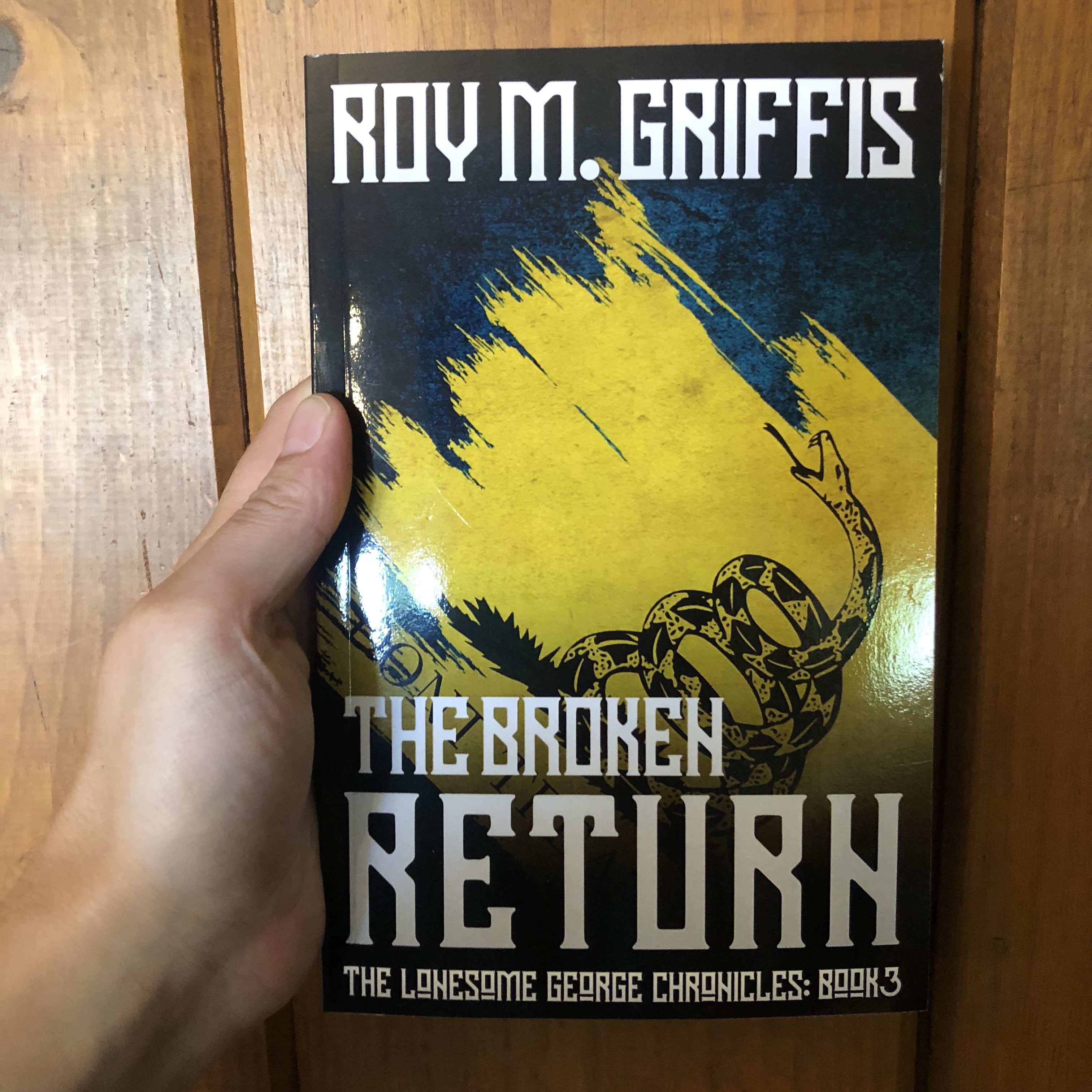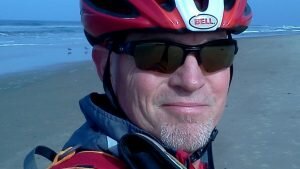He didn’t like the town of Crestline. It was a bit shabbier than what Alec recalled of Lake Arrowhead, with a thin, strained look about the buildings and an odd collection of thrift stores and little mom n’ pop shops. But worse, infinitely and weirdly worse, there was no one on the streets. And there was a smell about the place. Like a dead cat slowly decomposing under pine needles.
Litter, yes. Leaves across the asphalt, branches, and paper. He stopped to peer more closely at that last and saw that it was currency. Tens and twenties and Benjamins, scattered on the road like cast-off McDonald’s wrappers. He rolled along with the driver’s window a third of the way down, listening. The deeper into the town they got, the more pronounced the smell became.
Click here to purchase Griff’s post-apocalyptic thriller series The Lonesome George Chronicles.
He could make out bird noise, a lot of it; he even thought he heard the alien caw of seagulls. The wind. The old-man grumbling of the truck’s engine and, rather too clearly, the aggressive rumble of the Hummer about a hundred feet behind.
But nothing else. No engines, sure; he expected that from the EMP blast that Hanner had explained to him. But no doors opening? No groups of people skittering along bartering for goods or even looting the shops for food?
Where the hell was everyone? And what in the name of God was that stench?
The hair stood up along the ridge of his spine, and his breath came faster. The Chevy edged up to a four-way stop sign, but Baldwin didn’t roll through it. Just across the way was yet another body of water, this one a small lake with a park. To his right was a grocery store, cars in the lot. To his left, the road went up a hill into a neighborhood of homes that clung to the incline like insects refusing to be shaken free from a screen door.
Near the dark door of the supermarket, there was a strange organic kind of sound, and Alec turned his head. There was a scrum of dogs, skinny gray dogs by the partly open far door of the supermarket. From amid the scrawny furry legs poked a booted foot.
“Jesus,” Baldwin said, turning off the engine and climbing out of the truck, his hand on the holstered pistol. Distantly, he heard Hanner shout and the Hummer speed up.
“Get away from there!” Alec shouted as he ran across the parking lot that was nearly full of cars and empty of people.
At his cry, a few of the dogs looked. Son of a bitch! They weren’t dogs; they were coyotes—bright, savage eyes fixed on him. A few jerked away, but two stood where they were, unwilling to leave their meal. The two alphas opened their mouths, and awful black fluid dripped from the teeth and jaws.
The pistol came up in both his hands, and Alec tagged the lead coyote near the hindquarters. It jerked back as if he’d hit it with a baseball bat, making a terrible yip of pain. The boom of the Glock echoed off the front of the building and sent the other coyote running, while the first hobbled after it.
“Shit,” Baldwin said, and tried to aim more carefully.
“Don’t waste a bullet,” Hanner said, striding up beside him.
“I can’t let it suffer—”
“It’s a damn hard world now, Mr. Baldwin. Don’t waste the bullet.” Hanner walked at an angle away from him, out of Alec’s immediate line of fire, making for the body on the ground.
Following him, head turning from side to side to track for any other threats, Baldwin said, “I thought coyotes didn’t attack humans.”
“Babies, maybe. Not full-grown adults.” The old cowboy squatted by the body, tugging the collar of his tee shirt up around his mouth and nose as he did. He kept well back to avoid getting fluids on his boots. Alec stood guard, first checking the parking lot and then trying to pierce the darkness of the grocery store. The brightness of the afternoon sun made him effectively blind to the interior, so he listened as well as he could.
“I don’t think they attacked this woman, either.” Hanner’s voice was made less distinct by the tee shirt.
“It was a woman.” Oh, Jesus, it was. Her shirt had been torn open, revealing a now stained bra and the sagging, bruised flesh beneath.
“She’s been dead a while,” Hanner said in a thoughtful tone. “This whole damn town is ripe.”
“Can you tell what killed her?”
The cowboy stood. “No, not after the coyotes had at her. But we need to find out.”
Alec had a sudden, very queasy thought about what that might involve.
He was right.
Before they broke into a random home, Hanner told Mike, quite forcefully, that he and Becka were not to leave the cab of the Army truck for any reason, and if the two men had not returned by sundown, Mike was to backtrack down the mountain and get the hell out of there.
Finally, Mike spoke. “Where should I go?”
“Idaho,” Alec said. He gave explicit directions on how to get to the ranch. Maybe we should all just go back there, he thought. No reason for me to stay in California now. “You got that?” he asked.
“I do,” the chubby trucker said through the glass. Becka was at the passenger window, watching Baldwin keenly with eyes that were wide. Alec didn’t want to lie to her, so he just waved and turned to trudge after Hanner.
There were bodies in each home they invaded, the two men wearing gloves and masks taken from the supply stash in the Humvee. In the first home, a four-level ranch out of the ’70s, here were three sitting like collapsed piles of laundry on a couch before an older 27-inch television. The smell was beyond horrific, exceeding Baldwin’s ability to articulate, even to himself. Still, he forced himself to help the older man pull the couch with the bodies over by a large picture window, into the slanting afternoon light.
The cowboy, surgical mask over his nose and mouth, found a wooden spoon in the kitchen and used it to manipulate the bodies, which were neither swollen nor rigid, but from which a black thread of ants moved in a steady, regimented wave.
“Why aren’t they stiff?” Alec asked, just to have something to say, anything rather than just stare at the awful, macabre sight as the sound of his own breathing filled his ears.
“Rigor mortis passes as their bodies break down.” Hanner pressed the spoon against a jaw that hung slack, turning the head, which resulted in more new sounds that Alec struggled to process. The cowboy dragged down the (man’s?) collar, looking closely at the throat. He repeated this on the other bodies—of two women, Baldwin thought.
Hanner sat back, his boots flat on the ground, legs bent, arms hanging off his knees, a meditative pose common to many farmers and agricultural workers Alec had seen. “Hmmm,” he said, and then stood. “Come on, let’s check a couple others.”
In the other homes, they found bodies on stairs, on the kitchen floors. Only a few were found outside, and those had been partially disarticulated by scavengers. The old cowboy found a few children, and those pitiful remains he covered with whatever was at hand, a kindness for which Alec was silently grateful.
After five homes had been inspected, Hanner led Baldwin out onto the narrow street. They had climbed up into the hills nearly half a mile, and the streets had grown twistier and the houses less grand. Still, they could easily hear the engine of the Hummer, like a distant sleeping dragon. Higher up, there was a breeze that seemed to come from above them, fresher than the stagnant decayed air that seemed to hover over the little town. Alec turned his face into that faint zephyr and breathed deeply.
“I think we’re okay,” Hanner said, peeling off the gloves and tucking them into a trash can at the edge of a driveway, a strange move in this new and littered world.
“How can you say that for sure?” Baldwin kept his mask on, recognizing the illogic of it. He’d been breathing the air of Crestline for some time before putting the mask over his face, and if he was going to be infected by some airborne pathogen, then he had already been exposed, if not bathed in the stuff.
“No marks of infection. They weren’t puking their guts up, or worse. Anything like that we saw was the natural result of dying. Not a symptom of it.” He removed the mask, shoved it in his rear pants pocket, and took out his half-smoked cigarette.
“Well, what killed them?”
“I don’t know. Who knows what the Chinese or the Russians have been working on in their little back rooms? No ACLU or free press to keep them anything like honest.” He took a deep drag on the cigarette, and then another. This smoke wasn’t going to be saved. Now he was thinking aloud. “Neutron bomb that went off too high? But that would have killed the wildlife, too. I don’t know,” he repeated, taking another long pull on the cigarette.
“Do you think…everyone on the mountain is dead? Or down the mountain?” The idea of those cities to the south, ghetto-racked San Bernardino and the more affluent Riverside, as mausoleums that now housed only the dead, was vast and chilling. At that moment, Alec didn’t notice that this newly broken world could continually surprise him with fresh hells he had never imagined.
“I don’t know, Mr. Baldwin. But I’m pretty sure this little town is done for. We better get back to Mike and Becka. Usually, it’s worse to be the person waiting than it is to be the one going to see what’s happening.”
****



Comments
Leave a Reply